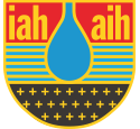“Look for problems in places where it is evident that people involved need answers because that implies that there will be a stronger motivation, support, commitment, and that leads to the achievement of objectives and farther contributes to the construction of a career as extraordinary as hydrogeology”
Tell us about yourself….
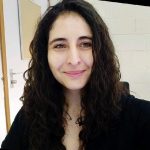 My name is Monica Guzman, and I was born in a small city called Sucre, located in the valleys of Bolivia. I have a bachelor’s in Civil Engineering (specializing in hydraulics), however I did my thesis in hydrology, which is unusual for a civil engineer. I chose hydrology because it took me out of my comfort zone. Up to that point in my life, I had focused on physics. Then I started learning in-depth statistical analysis. In fact, I had a tough time in the beginning, but thankfully it became easier with time. After finishing my bachelor’s, I applied for a scholarship funded by the Canadian International Development Agency (CIDA) and co-organized in a partnership between the University of Calgary (Canada) and the San Francisco Xavier University (Bolivia). Via this process, I entered the master’s program in hydrogeology.
My name is Monica Guzman, and I was born in a small city called Sucre, located in the valleys of Bolivia. I have a bachelor’s in Civil Engineering (specializing in hydraulics), however I did my thesis in hydrology, which is unusual for a civil engineer. I chose hydrology because it took me out of my comfort zone. Up to that point in my life, I had focused on physics. Then I started learning in-depth statistical analysis. In fact, I had a tough time in the beginning, but thankfully it became easier with time. After finishing my bachelor’s, I applied for a scholarship funded by the Canadian International Development Agency (CIDA) and co-organized in a partnership between the University of Calgary (Canada) and the San Francisco Xavier University (Bolivia). Via this process, I entered the master’s program in hydrogeology.
I have to say that what caught my attention about this program, was really that it challenged me to step out of my comfort zone once again, and the fact that groundwater is currently a particularly neglected area of study in Bolivia. It was a huge challenge for me primarily because at that time my field of study was “invisible”, and basic questions like” In what direction does groundwater move?”, “Or the possible flow velocity?” were being asked. It seemed impossible to answer just by going to the site and observing. So, in my opinion, you might feel very intimidated at first in respect to what you may find in the subsoil, especially if you have an engineering background.
Immediately after my graduation, I applied for a hydrogeology position in the Departamental Government of Santa Cruz. Although initially the work was essentially technical, oriented to the resolution of conflicts for water, two years later, I was promoted to Hydrogeological Head of the Department of Water Resources. That being said, it was not as good as it sounded, especially if you happen to be a 27 year old hydrogeologist working in a city with a significant amount of economic development, which of course, also depended 100% on groundwater. I began to receive the most complex and urgent water-conflicts “cases” which of course demanded technical and negotiation skills, and this received a lot of attention as well. Consequently, there was very little room for error; I had to mature professionally as fast as I could. After 3 more years of practicing hydrogeology strongly connected with solving day-to-day problems, I started working in the academy.
Right now, I teach in the Department of Civil Engineering, concurrently working on my Ph.D. in the Department of Hydrology and Hydraulic Engineering of the Free University of Brussels. I must say that the research I am doing has been the meeting point of all the things I’ve learned and practiced because I am modeling the recharge groundwater rates under post-fires scenarios in the Amazon. For this, I have used my hydrologist background, of course, my hydrogeologist one, and also my engineering practice background.
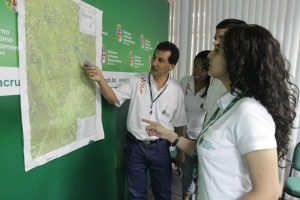 Why did you join IAH?
Why did you join IAH?
By the time I finished my master’s thesis and the second phase of the program “Water Management in Bolivia” was nearing its end, the first Bolivian Congress of Hydrogeology was organized. This congress brought together groundwater professionals from all over the country. I think the atmosphere generated by the congress, specifically getting to know professionals who are dealing with similar hydrogeological problems with the same limitations, made us find that sense of community and want to be an active part of it. So right there, many of us joined the IAH.
Since then, in addition to the annual high-level congresses and the Hydrogeology Journal, which I have appreciated because they were science-centered, I think that the sense of community promoted by the IAH has added significant value into my career. For example, in 2021 I was in San Marcos, Texas, and I wrote to my dear friend and mentor Jeff Green, who lives in Minnesota, who in turn kindly wrote to other hydrogeologists he knows to find someone in town that I could network with. Ultimately, Benjamin Schwartz from the Edwards Aquifer Research and Data Center (Texas State University), was available to show me the lowpressure springs with such a detailed explanation. These experiences are very enriching, and that’s just one example, I’ve traveled to countries where I’ve met people, who have given me a chance for technical, scientific collaborations, friendships, just because we are the same international team of professionals who study groundwater, and professional associations make it possible, from the most global ones like IAH, to more local groups or chapters; and I feel very grateful for that.
What would you say have been your career highlights (so far), successes, etc?, Any career “low points”, or experiences you have learned from, that you are willing to share with others? Particular challenges?
Personally I think that conducting a project on hydrogeology in my country is very challenging and constitutes an
outstanding achievement! I think that way because I have gone through many constraints like excessive bureaucracy, unclear regulations about groundwater issues and sexism at certain points. However, somehow we go through it and were able to create conclusions based on our research. Our conclusions giving some guidelines as to the application of the results found, feels like a success for me. I have to say that in that way I develop my resilience capability, that together with the passion I feel for my work, that is what takes me forward.
To give some examples, in 2013, we wanted to understand the groundwater dynamics in the shallow aquifer underlying a landfill, and therefore what would happen in the following years under different leaking scenarios; we performed flow simulations linked to the landfill operation, based on the outputs we proposed some guidelines to protect the most vulnerable areas to pollution. One year later the groundwater monitoring network in the area was enhanced, to keep producing hydrogeological data, that to update the simulations and continue to improve its operation. A few years later another monitoring network was implemented under the same criteria but this time in the new landfill of the city, I wasn’t involved on the improvements, but I know of them since I took my students to do fieldwork there and I am pleased with what has been achieved.
To provide one more examples, in 2016, we wanted to delineate the main groundwater recharge areas and validate the recharge mechanisms of the alluvial fan that supplies Santa Cruz de la Sierra city and the entire metropolitan area. This was quite challenging because the hydrogeological information was scarce and dispersed, and some of it was inaccessible; however, we had a hydrogeochemical database, so we used that with stable isotopes analysis,and the results allowed us to propose strategies to preserve areas like Urubo, a city overlying on one of the most hydrogeological meaningful recharge areas of the Santa Cruz metropolitan aquifer. Some of these strategies have “look for problems in places where it is evident that people involved need answers because that implies that there will be a stronger motivation, support, commitment, and that leads to the achievement of objectives and farther contributes to the construction of a career as extraordinary as hydrogeology” been implemented. To carry out this project, we collaborated with Prof. Ricardo Hirata, who was my professor. The last time I saw him was at the IAH Malaga congress, just before giving my presentation, I was a little nervous and he encouraged me, as usual. I realize that as I write the answers to this interview, more names of wonderful people I know come to my mind.
What have been the biggest changes you’ve seen over your career?
Regarding the practice of hydrogeology in Bolivia connected to water management, I haven’t seen as many changes as I would like. From my point of view a significant limitation has been that lost efforts invested on improving the groundwater preservation/protection have been individual, i.e. (a particular sector, an institution, a university, etc.), who have proposed and sometimes implemented actions for strengthening the groundwater management in Bolivia. That is the goal, but not necessarily the way because in practice some of these attempts have unfortunately not succeeded; in fact, some unfortunate cases have generated the opposite effect, and that’s because as a country, we haven’t agreed on how to take these steps and integrate them. To illustrate this, I don’t think the solution that leads us to promote integrated groundwater management is specifically the implementation of laws and regulations that bring groundwater to the same level as surface water; or the increase of scientific production in the field of hydrogeology, or the inclusion of our object of study (groundwater) within educational programs. We have to do it all, everything matters, and all is interconnected. To move forward it is necessary try to cover it all in a gradual but integrated way; and that is the moment in which an earth science shares the responsibility with a social science because groundwater management is real teamwork.
There are some examples of past attempts, one of them happened in 2016 when “Municipal Law of Protection and Conservation of water” was promoted to deal with the indiscriminate drilling of wells. I think we all agree that
legislation is a crucial piece to achieve groundwater protection. However, when it was the moment to regulate and apply this law it wasn’t possible. It was noted that there wasn’t enough information to apply the restrictions proposed. I mean, how do you prohibit drilling in certain areas without updated water balances at aquifer level? or how do you update your water balances without a piezometric monitoring network? Or without a reasonable number of hydrogeology companies to deal with the lack of information for implementing these regulations in the short term? Promoting these types of laws without considering how to make them work can be more damaging because you are forced to take it back and, in that way, you lose credibility. People will be attentive to the instructions; they will notice it which could be a constraint for future attempts. If you add the unfortunate coincidence that in the same year another government dependency was closing the groundwater quality monitoring network in the same region because of budget issues, people are not going to get a positive impression. On the other hand, of course, there are also many success stories on groundwater management in Bolivian aquifers, whose insights must constitute an essential part of water governance. Education is a crucial component as well, and there is so much to do too; I admire the work done by The Groundwater Project, I have known David Bethune since I was studying my master’s, and his vocation to help others is impressive. This kind of initiative deserves to be replicated in countries like ours.
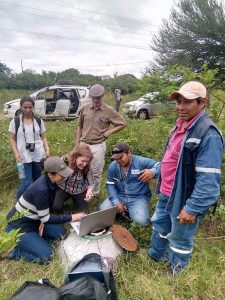 What three tips might you give to someone just starting out on their career?
What three tips might you give to someone just starting out on their career?
An essential part of my work and indeed of my life is the time I dedicate to teaching in the civil engineering department of the Catholic University of Santa Cruz, the hometown of my mother and mine for almost eight years; so, the tips I share below are a bit general and certainly apply also to young hydrogeologists who are about to start their career:
- Never stop learning, especially when we have so many online resources at our disposal, from complete online courses and specific tutorials to technical/scientific forums with professionals open to exchanging knowledge on particular topics. The tools we use to practice hydrogeology are continuously updated and diversified, so stay motivated and connected!
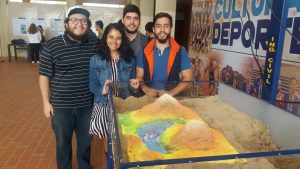 Be kind to yourself; sometimes, it is essential to recognize that although every one of us has received the same instruction in a particular post-graduate program; in practice, we will deal with different problems in different study sites, which will be instrumented (or not) on other ways too. Read a lot, be open and creative, because the literature also shows many unconventional ways to get the outputs you require; do not forget that there is also a lot of merit in the ability to do as best as you can with little, as long as you find the balance between technical rigor and the solution you are looking for.
Be kind to yourself; sometimes, it is essential to recognize that although every one of us has received the same instruction in a particular post-graduate program; in practice, we will deal with different problems in different study sites, which will be instrumented (or not) on other ways too. Read a lot, be open and creative, because the literature also shows many unconventional ways to get the outputs you require; do not forget that there is also a lot of merit in the ability to do as best as you can with little, as long as you find the balance between technical rigor and the solution you are looking for.- Do not underestimate surface water; this one is more specific to hydrogeologists. We usually demand groundwater be at the same level of importance as surface water in water management decisions, mainly because it has been dismissed many times. But many times in practice, we make a similar mistake, and we underestimate surface hydrology. From a modeling point of view, in practice, we have to deal with hydraulic conductivity and recharge rates, both highly sensitive inputs; and therefore, we can find infinite combinations of both that fits our assumptions and the calibration process; so improving our recharge estimations from hydrology water balance models can be pretty helpful. In the end, everything is connected, and that should be our philosophy. In my case, I am not allowed to forget this piece of advice since my father, sister, and many good friends, like Jaime Villena, are successful Bolivian hydrologists who inspire me too.
What do you think those starting out should do to gain good experience?
I think that the first opportunity to gain experience is through our theses; something very interesting happened to me when I was searching my topic and study site. I was convinced that I wanted to work in the lowlands of Bolivia, specifically in Santa Cruz de la Sierra City, not only because it is a city of significant development but because it strongly depends on groundwater, so the balance between economic development and sustainable water use was starting to reflect some problems. I had an interview with the most significant water cooperative in the city, I was very excited by the idea of working with a cooperative that has the challenge of providing water to a city of more than 1.5 million inhabitants, and it seems the ideal place to put groundwater modeling into practice; however, at the time the coordinator of the master’s program, Brendan Mulligan, was also in Santa Cruz and suggested to visit the city landfill to explore if there were any options to research with them; the Head of that institution received us, and I remember every detail of that meeting; especially for what he said, and I quote him: “We have these groundwater heads measurements, this chemical analysis that shows us that we are accomplishing the regulations, some tendencies from our monitoring network, but what does this mean? What’s going on below our landfill? How long will these conditions be maintained? What can we do to maintain or improve them?”. Those few intelligent questions that needed to be answered challenged me, I have to say that at that time, I knew very little about landfills, but until that point, I had never felt so motivated to start a research project because I felt I was in the right place and at the right time to help; and at the end of the day, that’s what hydrogeology is for, help answer difficult questions about water that lead to better decision-making.
So my advice is to look for problems in places where it is evident that people involved need answers because that implies that there will be a stronger motivation, support, commitment, and that leads to the achievement of objectives and farther contributes to the construction of a career as extraordinary as hydrogeology.
Your future plans? Aspirations?
At the moment, we have high expectations of what we are doing, and this is because we are dealing with a latent problem in the forests of the Bolivian Chiquitania. In my country, we have a common practice called “chaqueos” with is the land conversion by burning. This practice has the purpose of getting rid of the natural land-cover to make it suitable for agriculture and livestock; unfortunately, many times, the authorizations involved don’t consider the impact that this generates on resources such as water, and still, if these practices are not carried out correctly, they can cause wildfires affecting large areas, where communities that depend on springs (essentially groundwater) are settled. Water scarcity is also a common factor among them.
This complex situation motivated us to investigate the connection between these two problems using models. We started four years ago in the municipality of San José de Chiquitos; starting was quite challenging since the lack of hydrogeological information required additional fieldwork, and the wildfire occurrences often limited the 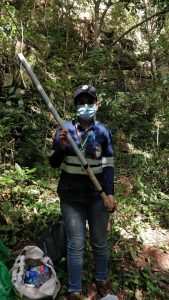 entrance to the site. However, we are concluding this study, and we plan to continue five more years in other municipalities. The final goal is to generate enough technical and scientific information about the water security risks involved and open this issue for discussion with all the stakeholders to find better ways to deal with it. We know this project is ambitious, and I am part of a very competent team, which has brought together local and international researchers with the same objective, starting with my promoter Marijke Huysmans who is one of the most talented researchers and leaders I have ever met, her master’s students, my colleagues from the Department of Hydrology of the VUB, my Bolivian students, all of them with a strong commitment. I am convinced that this is how changes happen.
entrance to the site. However, we are concluding this study, and we plan to continue five more years in other municipalities. The final goal is to generate enough technical and scientific information about the water security risks involved and open this issue for discussion with all the stakeholders to find better ways to deal with it. We know this project is ambitious, and I am part of a very competent team, which has brought together local and international researchers with the same objective, starting with my promoter Marijke Huysmans who is one of the most talented researchers and leaders I have ever met, her master’s students, my colleagues from the Department of Hydrology of the VUB, my Bolivian students, all of them with a strong commitment. I am convinced that this is how changes happen.
Monica Guzman
